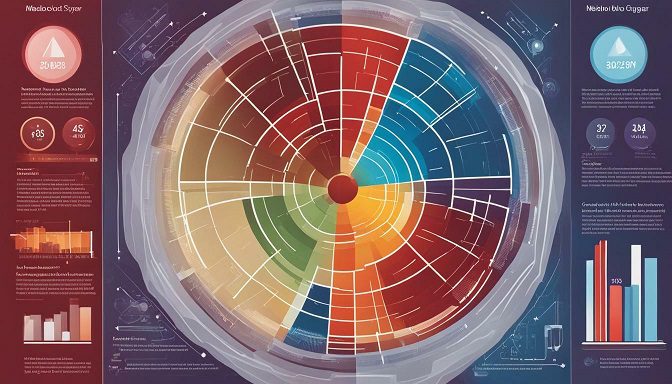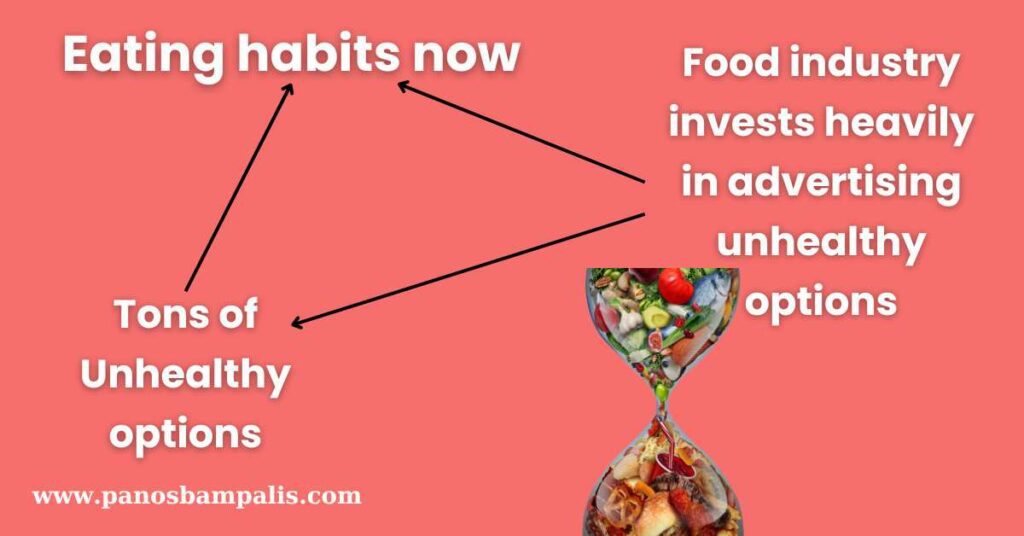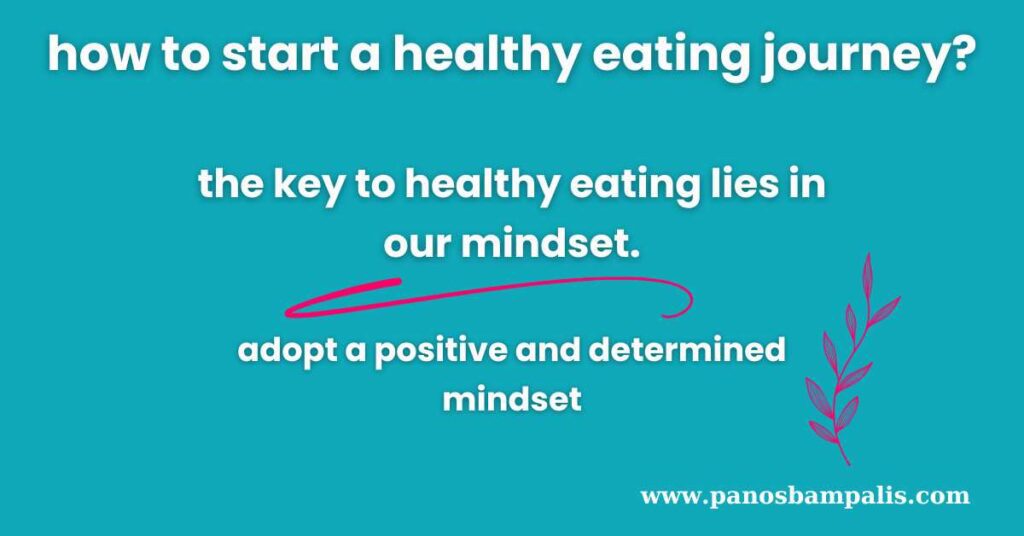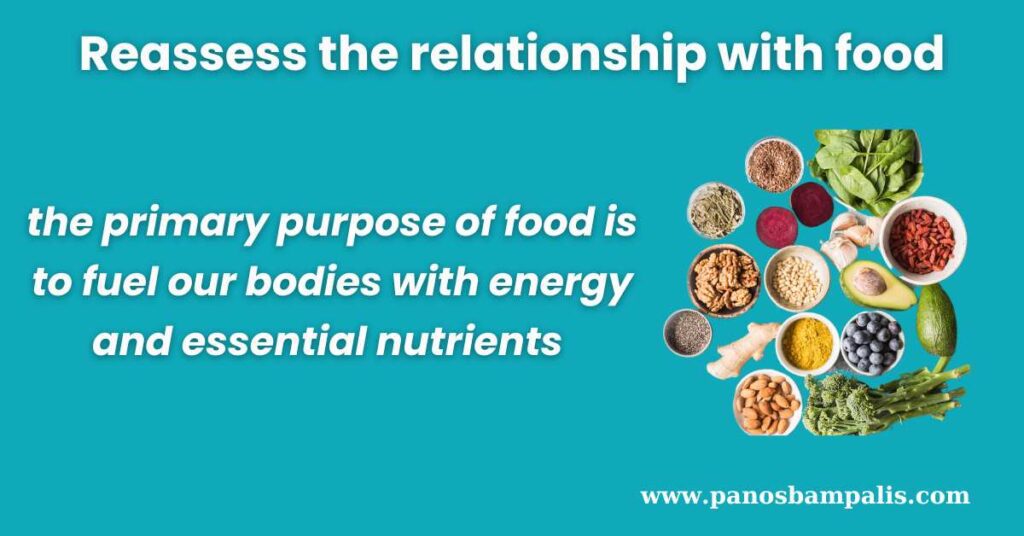Eating healthy doesn’t require learning fancy new skills – it’s an innate ability we all have. You can start shedding pounds and boosting your health by returning to basics.
⚡TL;DR – How to start eating healthy to lose weight

- Fad diets on 21st century promise quick fixes but often backfire long-term
- How to start? Change your mindset first.
- Discover the essential purpose of food
- Train yourself – Resist to unhealthy lifestyle
- Building better habits takes mindfulness and commitment to self-care
For too long, misinformation and restrictive diets have made healthy eating seem out of reach. But the truth is, we’re all born intuitive eaters. Reconnecting with simple nourishment is your springboard to lose weight and improve your well-being.
This post breaks down actionable steps to refresh your relationship with food.
You’ll discover the missing link in maintaining a healthy weight and how to train yourself to eat healthy and feel fuller.
With self-compassion and dedication to better habits, you can shed excess pounds and unleash feel-good energy.
Eating habits in the 21st century
Before we start, let’s define the problem we face- the true pandemic of bad eating habits and poor health sweeping almost all the world.
In the 21st century, people have developed nasty eating habits. They’re now more likely to eat for pleasure and entertainment than out of necessity, and they’re drawn to ultra-processed foods, junk food, and foods full of saturated fats.

People are more concerned with the taste of their food than the quality. They have become used to eating meals high in saturated fat and sugar, and as a result, they have lost touch with what it means to eat for sustenance.
Instead of eating to satisfy their hunger, they eat to satisfy their cravings.
As a result, rates of obesity, heart disease, and other chronic diseases are skyrocketing.
Why do I struggle to eat healthy?
Eating healthy can be a challenge for many reasons.
Most notably, our diets have been taken over by processed foods. These options typically contain sugar, fat, and empty calories while lacking essential nutrients. They are also incredibly convenient and more affordable than healthier choices, making it easy to over indulge.
As a result, we often consume too many calories and miss out on the vital nutrients our bodies need to thrive.
On top of that, the food industry invests heavily in advertising these unhealthy options, making it difficult to resist their appeal. This can make it challenging to find healthy alternatives when we’re out shopping or dining.
Unfortunately, even when we try to eat well, we’re constantly bombarded with images of tempting, unhealthy foods. This can give the impression that healthy eating is boring and limiting. With such enticing options, it’s easy to see why many people struggle to stay on track with their healthy eating goals.
Overcoming resistance can be challenging, but we live in a society heavily relying on packaged and processed foods. Food has become a central part of our entertainment and enjoyment in modern times.
Everywhere we turn, countless restaurants, fast food joints, and upscale eateries offer convenient, ready-to-eat options. The pursuit of delicious pleasure drives many people as they seek to satisfy their taste buds on their ongoing journey.

The missing link to starting healthy eating
Every time you search for advice on how to begin a healthy eating journey, you come across the same old tips: eat your fruits and veggies, choose healthy fats, steer clear of processed foods, go for whole foods, and so on. Sound familiar?
These tips are great, but they only take us so far.
What is the key thought to adopt? Read below about the essential purpose of food!!
They point us in the right direction but need to answer the big question of how to start a healthy eating journey.
In reality, the real challenge lies in overcoming the obstacles that stand in our way, such as food factories, advertisements, and social eating habits. That’s why the key to healthy eating lies in our mindset.
Instead of following rules, we must shift our thinking and approach towards food. Let’s focus on adopting a positive and determined mindset to kickstart our journey towards healthier eating.
How can I train myself to eat healthy?
Getting on the path to a healthy diet begins with training our minds. It’s all about developing a new mindset when it comes to food. Just like any other skill, it takes time and effort to master. But believe me, it’s worth it! The health benefits go way beyond what you might expect.
The first step in this training is becoming mindful of our current eating habits. We need to be aware of what makes it challenging for us to eat healthily.
Do we turn to food when we’re stressed or bored?
Do we reach for sugary or fatty foods when we’re feeling down?
Understanding our triggers is the first step towards conquering them. Once we’ve identified the problem, we can start to work on retraining our minds and educating ourselves about our genuine relationship with food.
It’s crucial to reassess that relationship and ask ourselves an important question: What changes do we need to make to develop a healthier mindset towards food?

What is the essential purpose of food?
Let’s remind ourselves that the primary purpose of food is to fuel our bodies with energy and essential nutrients so that we can function at our best. It’s time to prioritize this purpose above all the other reasons we’ve come up with.
It’s essential to consciously try to keep this purpose at the forefront of our minds daily, every hour. Keep asking yourself: What is the primary role of food? And keep giving yourself the same answer: We need healthy food to provide the necessary nutrients for our bodies to function and thrive.
Embracing a mindset of ancient times comes naturally to us. Our ancestors, living in primitive and ancient times, had a pure connection with food, viewing it as vital for survival and a source of energy to carry out essential natural activities.This is an info alert. Lorem ipsum dolor sit amet, lectus adipiscing elit.
Shifting our perspective on eating requires dedication and time. Once we adopt this new mindset, making healthier food choices will become second nature.
How can a beginner start eating healthy?
First and foremost. Don’t be afraid!
Parting with all the delicious, fatty, and indulgent foods we adore can feel overwhelming. It may seem unimaginable to break free from the eating habits we’ve held onto for so long. Our inner being resists letting go of these familiar routines despite knowing they’re harmful.
However, if we take a step back and consider the bigger picture, it becomes evident that transitioning to a healthier diet is a crucial change. Therefore, don’t allow fear or apprehension to prevent you from embracing this beneficial change.
Start acting!
- Take a closer look at your eating habits and challenges in making healthy choices: Keep a detailed record of everything you eat, when, and how it makes you feel. Consider the factors influencing your food choices and how your social environment affects them.
- Educate yourself about the true purpose of food: Challenge yourself to see food as an energy source and essential nutrient for your body. Dedicate time and effort to training your mind and changing your mindset.
- Empower yourself with knowledge: Discover the essential nutrients our bodies crave and how we can fuel up on them through the foods we choose to eat. Dive into the world of simple and complex carbohydrates (think whole grains and brown rice), nourishing fats (like olive oil, nuts, and fatty fish), and the goodness of fresh fruits, veggies, dairy, and lean proteins (like grain-fed beef). This understanding is your strength, equipping you to make informed decisions when stocking up on groceries or dining out.
Finally, be patient with yourself and don’t expect overnight results. Making lasting changes to your diet takes time and effort, but it is worth it.
Summing Up
Congratulations on making it this far!
I hope you’re feeling motivated to tackle changing your relationship with food. It will be challenging, but the knowledge shared in this series should help make the process more manageable.
Change doesn’t happen overnight, so take things one step at a time and be patient with yourself.
And most importantly, remember to celebrate your successes along the way!
FAQ
1. What are the first steps to take to lose weight?
To begin a healthy weight loss journey, set specific and realistic weight loss goals. Consult a registered dietitian or a dietitian to develop a personalized plan for healthy weight management.
2. Are there any specific dietary guidelines to consider for losing weight?
It’s essential to focus on consuming healthy foods from all food groups, including whole grains and healthy fats. Incorporating fiber can also support weight loss and help you stay healthy.
3. How can I adjust my eating habits to support weight loss?
Try to practice mindful eating and eating slowly. Another approach is to eat healthy foods with low-calorie and high satiety to help you feel fuller for a longer time without consuming excess calories.
4. Can physical activity accelerate weight loss?
Yes, incorporating weight training and regular physical activity can help you lose weight quickly and improve your overall health.
5. Are there any science-backed tips to help me lose weight?
According to a study, eating slowly and including more fiber can effectively get your diet back on track and support weight loss.
6. What role does a registered dietitian nutritionist play in weight loss?
A registered dietitian nutritionist can provide personalized advice, help you lose weight, and guide you toward healthy weight loss while improving your eating habits.
7. What are some foods that can aid in weight loss?
Include healthy fats, whole grains, and fiber in your diet to support weight loss and help you feel fuller longer, which can support weight loss and improve satiety.
8. How can mindful eating help in losing weight?
Practicing mindful eating and eating slowly can help you stay aware of your hunger cues and prevent overeating, which can support weight loss.

